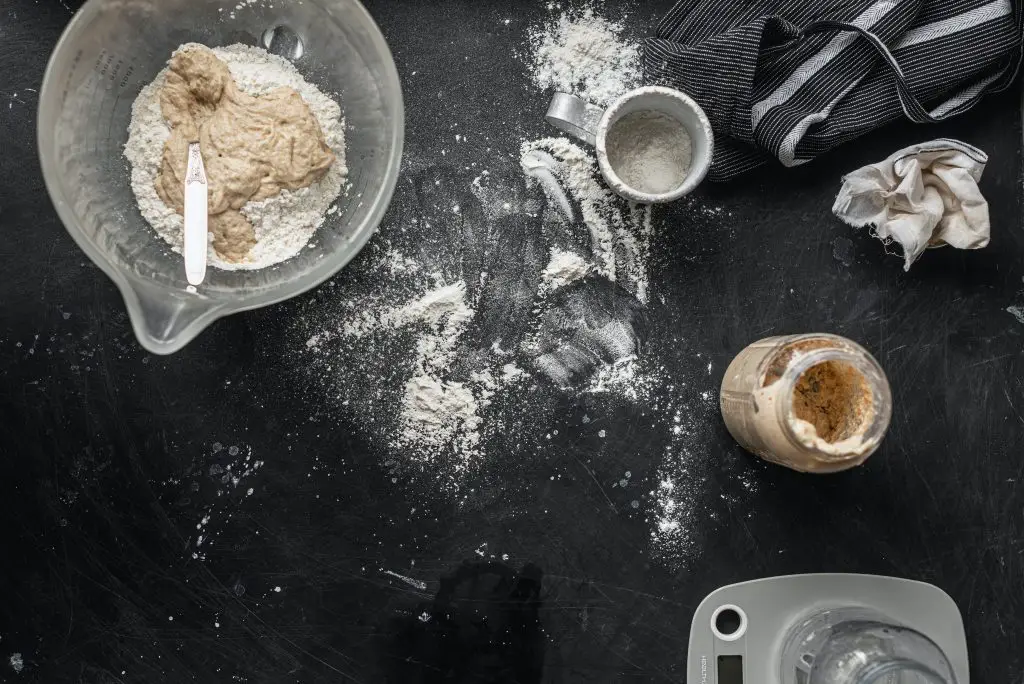After having my fourth child, I was experiencing health issues that the doctors deemed chronic. So, I decided to make changes to my diet and lifestyle, among which was making sourdough bread. Ten years into it, the health improvements I have experienced are tremendous. But, how does sourdough bread really improve health?
What is sourdough?
In the last few years, the talk about sourdough bread made a comeback. Sourdough yeast is also known as natural yeast or a starter. It results from fermenting equal parts water and flour, where beneficial bacteria and wild yeast grow. After a few days of feeding the starter becomes strong enough to make a loaf of bread.
The resulting starter leavens the dough, giving it a distinct tangy flavor and chewy texture that many people enjoy. Because sourdough is naturally fermented, it is often easier to digest than commercial bread and may have additional health benefits.
What is the difference between sourdough yeast and regular yeast?
Sourdough yeast works by feeding on the gluten strands of the dough. The commercial yeast is lab-made and bred to make faster leavening.
Sourdough yeast takes a long time to rise the dough, while commercial yeast takes a fraction of that time.
How does sourdough yeast make a better bread?
When it comes to taste, we may not have a definite answer since “Colors and Flavors do not dispute.”
However, according to the studies, the complex flavor does have scientific truth. “The fermentation process of sourdough is highlighted to bring more flavor, complexity, aroma, and better texture of bread due to LAB enzymatic hydrolysis processes and the generation of compounds in the Maillard reaction during the baking process.”
For many, sourdough bread is much easier to digest than regular yeast bread and keeps them full for longer times. I prefer sourdough bread over any regularly leavened bread for all the above reasons and the upcoming ones below.
Studies also showed that sourdough bread has a longer shelf life, resisting spoilage due to its high acidity, reducing the growth of bad bacteria.
What makes sourdough good
Sourdough bread may be good for gut health in many ways other than adding good bacteria.
During the fermentation process, lactic acid bacteria and wild yeast break down some of the carbohydrates and proteins in the bread dough, making them easier to digest and increasing the bioavailability of certain nutrients.
Also, sourdough bread has a lower glycemic index than many commercial breads, which means it causes a slower and more gradual rise in blood sugar levels. This can help regulate blood sugar and insulin levels, which may benefit overall health.
Finally, some studies have suggested that sourdough bread may be easier to digest than commercial bread, possibly due to the longer fermentation time and lower phytic acid content. This may make it a good option for people with digestive issues or sensitivities to gluten. However, it’s important to note that sourdough bread does still contain gluten and is not suitable for people with celiac disease or gluten intolerance.
The following section will show the benefits in some detail.

What are the benefits of sourdough bread if the yeast dies after baking?
Sourdough benefits are not confined to the presence of natural yeast. According to the National Library of Medicine, the study of sourdough microorganisms revealed amazing facts.
- Each sourdough starter hosts different yeast and Lactic Acid bacteria communities. “The different species require different conditions for optimal growth, hence the proportion of each species found in each sourdough starter also varies.” The use of different types of flour also leads to diverse LAB and yeast communities. This diversity allows for a better breakdown of carbs which are the culprit of industrial bread.
- Sourdough bread is beneficial to the gastrointestinal tract, especially for those who suffer from intolerances such as IBS. The natural work of LA bacteria breaks down the short-chained carbs, AKA FODMAPs, which are hard to absorb.
- Bacteria also break down the gluten protein which could benefit people with gluten intolerance.
- Consumption of sourdough bread can also reduce the inflammatory discomfort and flatulence caused by the presence of phytic acid after digesting regular bread.
- Another benefit of consuming sourdough is that it does not cause a spike in blood sugar, leading to longer satiety periods.
Does flour matter when making sourdough?
According to the same study shared above, using different flours does affect the amount and quantity of the wild yeast and bacteria present in the sourdough starter. However, that does not imply that one is better than the other. It only reinforces the fact of the diverse bacterial and yeast communities in each loaf of bread.
“Some other factors affecting sourdough microbiota, including fermentation temperature and backslopping time, are also closely related to the types of flour used since microbes present in flour naturally prefer different fermentation conditions. The types of microbes which grow in sourdough starters from different batches or types of flour are not necessarily the same due to the different quantities and qualities of carbohydrates, proteins, minerals, lipids, and enzyme activities, different amounts of microbial growth factors, and also due to the presence of microbial growth inhibitors.”



